|
|
|
Sort Order |
|
|
|
Items / Page
|
|
|
|
|
|
|
| Srl | Item |
| 1 |
ID:
174597
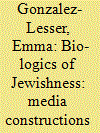

|
|
|
|
|
| Summary/Abstract |
The specific ethno-racial position of Jewishness offers an ideal case study for contemporary U.S. racialisation processes. Despite a proclaimed end to biologisation in a supposed ‘post-racial’ era, essentialist reasoning remains central to U.S. race-making. Employing a content analysis of the New York Times and the Los Angeles Times (2000–2010), I find that biologically rooted constructions of Jewishness occur through appeals to (1) physical definitions based on DNA or phenotype, and (2) subtle biologisation vis-à-vis ancestral claims. Demonstrating both explicit and subtle biologisation expands social scientists’ understanding of race, ethnicity, and Jewish identities.
|
|
|
|
|
|
|
|
|
|
|
|
|
|
|
|
| 2 |
ID:
174600
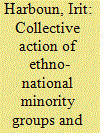

|
|
|
|
|
| Summary/Abstract |
Collective action requires resources, organization, leaders and political opportunities. In the case of disadvantaged minority groups, long-standing conflict with the majority, a closed political opportunity structure and the difficulty of acquiring resources, increases the costs and risks of the action. We argue that the development of such an action is a function of leaders’ perceptions about the cost of inaction (COI) and symbolic resources of the group, such as solidarity. Combining these evaluations creates three trajectories: growth, restriction and decline. We examine this argument by four collective actions carried out by Arab Palestinians citizens in Israel to improve education. The findings show that leaders increased efforts even if they assessed opportunities are limited when they thought that COI is high, since inaction means not only the loss of instrumental costs but also the loss of potential symbolic gains such as recognition of the group collective identity.
|
|
|
|
|
|
|
|
|
|
|
|
|
|
|
|
| 3 |
ID:
174598
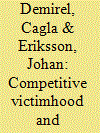

|
|
|
|
|
| Summary/Abstract |
This paper argues that conflicts tend to be intractable if collective victimhood has become a component of national identity, and when conflicting communities claim to be the ‘real’ or ‘only’ victims, and that their suffering justifies crimes past and present. Turkish and Armenian narratives of competitive victimhood are analysed drawing on public opinion polls from Turkey and Armenia, and personal interviews with Turks and Armenians. The study corroborates past theory and research that competitive victimhood prevents reconciliation, particularly if it has become an essential part of national identity. The paper also shows that Turkish–Armenian relations remain at the bottom stage of the reconciliation ladder. Yet, some of our empirical observations suggest that when grass-roots level interaction between Turks and Armenians is facilitated (which has been prevented not least because of the closed border), there is room for the abandonment of competitive victimhood at least on an interpersonal level, if not on a general societal or political level.
|
|
|
|
|
|
|
|
|
|
|
|
|
|
|
|
| 4 |
ID:
174601


|
|
|
|
|
| Summary/Abstract |
Drawing on interviews with thirty-two black British professionals, and ethnographic work in middle-class cultural spaces across London, this paper asks ‘How do the black middle-class use cultural consumption for anti-racism?’ I argue that the black middle-class contest the racial hierarchy at three levels through their cultural consumption: the material, the ideological, and the symbolic. At the material level, black middle-class people consume cultural forms they decode as ‘white’ in order to establish an equity with whites in levels of cultural capital. At the ideological level, black middle-class people consume cultural forms that uplift meanings and representations of blackness, thus challenging controlling images of blackness. Lastly, at the symbolic level, black middle-class folks create and sustain cultural spaces where black people’s cultural and symbolic knowledge is given proper recognition and authority.
|
|
|
|
|
|
|
|
|
|
|
|
|
|
|
|
| 5 |
ID:
174602
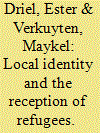

|
|
|
|
|
| Summary/Abstract |
A strong local community identity often goes together with the rejection of refugees and other migrants. However, there is also the possibility that such a local identity actually stimulates the reception of refugees. Based on the social identity perspective and our ethnographic fieldwork we examine this possibility in the context of the small town of Riace in Southern Italy. The analysis demonstrates that there is a local identity of hospitality that is construed as a continuation of the town’s past. This identity of local hospitality is enacted and maintained in various ways in the life of the town in which the mayor as an entrepreneur of the local identity plays a critical role. However, there are also some challenges to the future of the local identity of hospitality that relates to available financial resources and competition over local opportunities.
|
|
|
|
|
|
|
|
|
|
|
|
|
|
|
|
| 6 |
ID:
174599
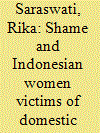

|
|
|
|
|
| Summary/Abstract |
Studies on divorce and shame in Indonesia have found that shame has been used by the Indonesian government to restrict divorce; however, this built on existing negative cultural constructions of the female divorcee. Although being a widow is also stigmatised by the public, this is to a lesser extent than for a divorced woman. Research has shown that the concept of shame has been one of the barriers that women face when considering disclosing their marital problems, in this instance domestic violence. In general, this concept continues to exert influence on and within Indonesian women as it has been culturally and legally embedded in Indonesian society. Regardless of their identities, all respondents felt shame when they experienced domestic violence. The experiences of Indonesian women in responding to and making decisions dealing with domestic violence differ because their response depends on their needs and interests.
|
|
|
|
|
|
|
|
|
|
|
|
|
|
|
|
|
|
|
|
|